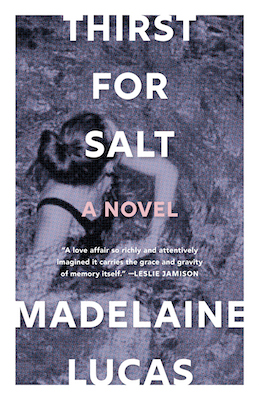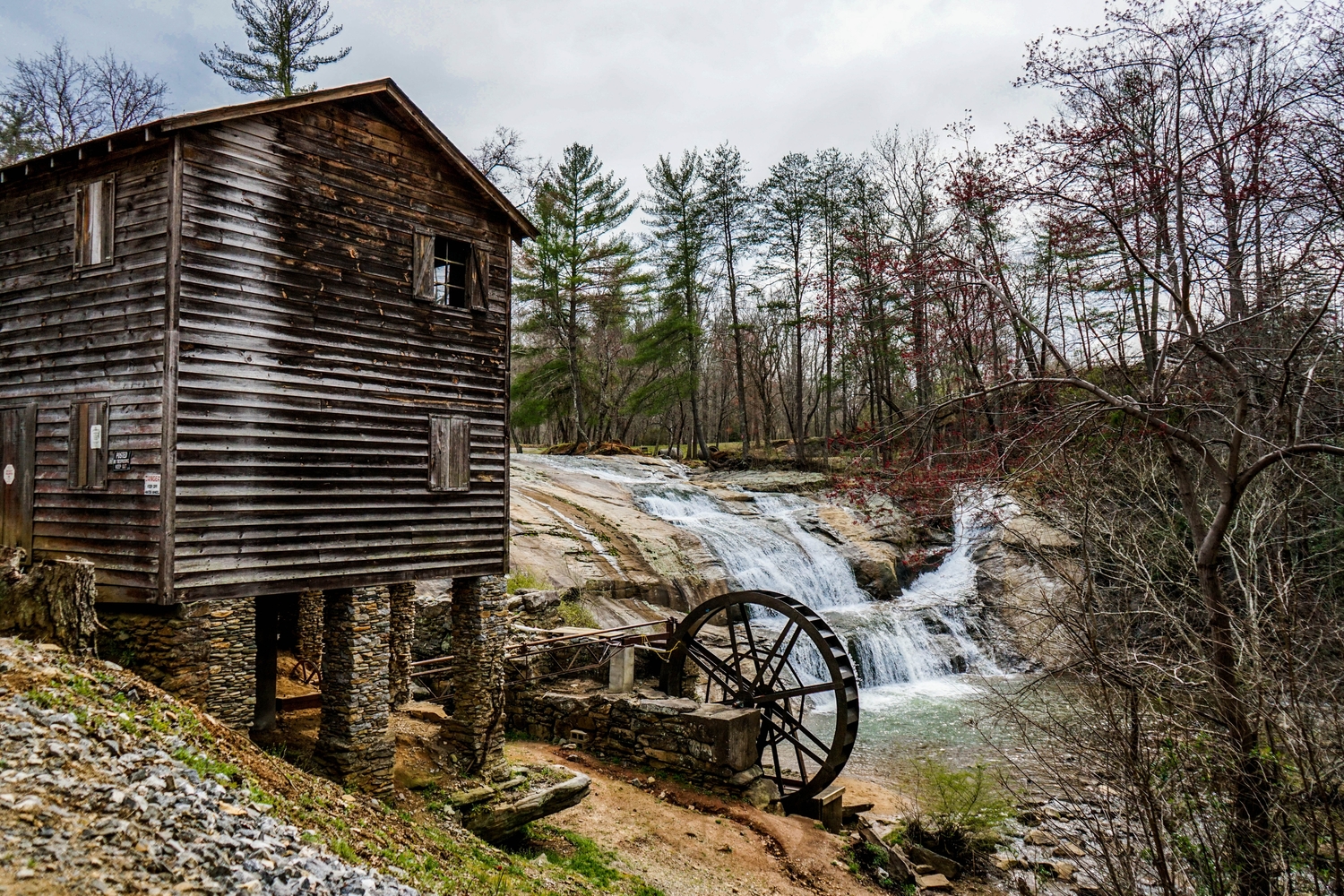interviews
A Young Woman’s Perspective on Being With an Older Man
Madelaine Lucas’s novel "Thirst for Salt" follows the blossoming of a May-December romance, set in a remote Australian beach town

Formative love affairs and sentimental educations are classic novelistic territory. And for good reason— these connections serve as catalysts, tell stories taut with tension, and leave characters forever changed. Madelaine Lucas’s debut novel Thirst for Salt describes such a relationship, set in a remote Australian beach town as summer shudders into winter. She does so with such nuance and depth that what begins as a love story becomes much more—an exploration of memory, family, the seemingly impossible task of truly knowing another person, and the scars that intimacy leaves behind.
The novel’s narrator recalls her relationship with Jude, an older man she meets while on holiday with her mother, from a distance. She’s many years and an ocean away from him, but Lucas’s delicate and exacting prose weaves the present and past together with immediacy. Her sentences reflect an exacting eye for detail and landscape, while creating a world rich with texture and character. As I read, I could hear Patsy Cline’s voice echoing off the beams of Jude’s house by the beach, feel the bracing winter wind rattle the windows.
Thirst for Salt questions how we remember, roads not taken, and what happens when desire and connection turn to loss. Having read and known Lucas for years, I’m always moved by the wisdom and empathy inherent in everything she writes. Her novel is a testament to love in all its forms, and how it shapes us, like I’ve never read before.
Francesca Giacco: Thirst for Salt revolves around a long-ago love affair between the narrator and Jude, a man 18 years her senior. We’ve both written about relationships with this dynamic—it’s one that’s been written about many, many times. What interested you about an age difference like this? How did you explore it and subvert it?
Madelaine Lucas: Originally, I was drawn to the dynamic of a younger woman and older man because I saw it as a way to dramatize the larger structural power imbalance between men and women within the more intimate space of a romantic relationship. But as I continued working on the novel, I realized that the characters couldn’t just be symbols representing something—they had to feel like real people. Even though the May-December romance is a cliché, these narratives tend to be driven by a man’s desire for a younger woman. To me, the question of what the younger woman is getting out of the relationship is a more interesting one, and in my narrator’s case, the answer is not so obvious. Jude has more experience than her by virtue of being older, and he’s at a more stable stage of life, but her desire for him isn’t clearly based on trying to get close to power or capital. The issue with cliches is that they erase complexity, and so I wanted to bring some nuance to this dynamic by looking at it more closely, and writing about it in a way that would give my narrator agency.
FG: The power dynamic seems to shift between them throughout the novel, but one thing they both possess and draw strength from is the world they build together. It’s so insular, even claustrophobic at times.
[The May-December romance narratives] tend to be driven by a man’s desire for a younger woman. To me, the question of what the younger woman is getting out of the relationship is a more interesting one.
ML: The power couldn’t constantly go in one direction, because then their relationship would be static, and that didn’t feel true to any experience of intimacy I’ve had. There are always shifts between who feels like the more loving one versus the more loved one, or who feels more in control or more vulnerable. That daily ebb and flow was one of the things I wanted to illuminate.
FG: There are glimmers of the narrator’s life outside this relationship, and they’re almost startling, given how focused she and Jude are on one another. Why do you think their relationship needed to be so contained and symbiotic?
ML: One of the things I most wanted to explore in the novel was that first experience of adult intimacy, where you can really imagine building a life with someone for the first time. That can be equally formative as first love, though I feel like there isn’t as much literature dedicated to it. There is a stage of that kind of love that can be quite myopic and insular, and I wanted to immerse the reader in that private, domestic world.
FG: Water is a constant throughout this story. It’s comfort and danger. It mirrors and obscures. What was it about water, rain, the ocean that captivated you and became so essential to the novel?
ML: I’ve always lived in places where water is very present, whether that’s in coastal places like Sydney or even here in New York. For me, it’s been a way to connect to my own emotions and also to feel in the presence of some larger force. Swimming in the ocean—particularly in the beaches around Sydney, where the open water can be quite rough—is so cathartic, and I think it’s partly because you feel your own smallness in the face of its enormity. It puts things into perspective. Also, if you spend a lot of time in your head, as my narrator does, being in the water is a way to connect to your body. The interior noise can float away.
I was also interested in how the ocean, with its moods, resembles our changeable emotional states. It can move from being calm and placid to more chaotic and tumultuous. The ocean’s tidal, cyclical rhythms seemed to parallel those of love, grief and memory.
FG: At certain points, when she’s in the ocean, your narrator notices she’s willing herself to forget what else might be out there with her, the dangers she can’t see. I guess that’s somewhat similar to love, too.
There are always shifts between who feels like the more loving one versus the more loved one, or who feels more in control or more vulnerable. That daily ebb and flow was one of the things I wanted to illuminate.
ML: Yes, both involve suspending your disbelief, knowing that risk is always there but that the pleasure makes it worth it.
FG: There’s a scene in the novel, set in a pub, that, to me, served as a catalyst. Before this scene, the narrator’s foundational relationship is the close one she has with her mother. And after, she starts to create a life with Jude. I also just love scenes set in bars or at parties, because I think they carry so much dramatic potential. Why did you decide to write one, and in this way?
ML: The pub scene is the first time the narrator and Jude have to interact in public view, and it forces them to reckon with how they see each other and themselves, as well as the reactions of others, including Jude’s friends and the narrator’s mother. That scene was one of the most difficult to write. There were a lot of pieces that needed to come together, and I did see it as the climax of Part One, as well as a pivotal moment when they both have to make a decision about whether their relationship can survive outside their own contained world.
FG: You write that “roles can get confused in small families,” which I’ve found to be true. They can become even more confused when a parent is young, or relatively close in age to their children, as the narrator’s mother is. How did you devise this family structure?
ML: I was interested in the way family dynamics are complicated when the usual roles are collapsed or inverted. The narrator and her mother joke that they raised each other “like two sisters”, and while that’s given them a uniquely close bond, having a youthful, impulsive mother also forced the narrator into the position of having to be the responsible, cautious one. In her relationship with Jude, she starts to take risks for the first time, and this challenges the dynamic between her and her mother. Just like romantic relationships, there are patterns in familial relationships, too, and when someone steps out of the part that they normally play, it can feel threatening.
FG: It’s said that our parents’ dynamic with one another serves as our blueprint for future romantic relationships, whether it’s what we want to emulate or avoid.
ML: Yes, exactly. One of the things I wanted to explore in the novel was the influence of what we learn about love from our parents’ story. The narrator’s choices about love and motherhood, whether they’re similar or different to what she saw growing up, are always made in relation to her own mother in some way. She can’t escape that.
FG: Henry, the narrator’s brother, is an almost ghostly presence in the novel. He only physically appears once, but is mentioned often, and always as if he holds the promise of male connection, someone she can love in this very straightforward, uncomplicated way. How did you decide to give him this kind of spectral influence?
ML: Henry is essential to the narrator’s sense of who she is, and her thoughts about motherhood are shaped by the fact that she played a maternal role in caring for this sibling who’s twelve years younger than she is. But she’s at a point in her life that necessitates breaking away from her family as she tries to build something new of her own. Their relationship is not at the forefront of her life at this moment, the way it might have been when they were younger, and because of the big gulf in their ages, they’re not going through the same things at the same time. There is a lot of thinking in the novel about how absence or lack can shape us, so it felt important, for contrast, to show a relationship that isn’t threatened by periods of being apart. Their connection is strong, even if Henry is not a part of her day to day.
FG: Music adds so much depth to the story and its setting. It also becomes a sort of bridge between the narrator and Jude, part of their shared language.
ML: Growing up with musicians and playing music myself, it’s such a huge part of my consciousness. It’s also so bound up with memory—defining moments in my life have been punctuated by the songs I was listening to at those times, and I wanted to replicate this in Thirst for Salt. Referencing a song, to me, is like quoting poetry—it’s another way to add texture and resonance to the story, and a shortcut to revealing something about the characters.
I often joke that one of the most generous things I did for Jude was giving him my taste in music. [Laughs] The scene where the narrator goes through his record collection gives us a glimpse into his interiority that we don’t otherwise get to see.
FG: One of my favorite characters in the book is King, a dog that the couple finds and adopts as their own. Why did you decide to bring him into their lives, as this sort of connective presence?
Part of what makes the end of a relationship so painful is not only the memories of the time you spent together, but the way you mourn forward for the future you never got to live out with that person.
ML: King was a part of the story from the beginning. He has a sort of mythical presence in the book, and, in some ways, I think of him as a manifestation of all the best parts of their relationship. I also wanted the novel to hold visions of love that weren’t romantic. To me, the dog-human connection is one of the most profound we can have. It’s not strictly unconditional, but it’s the closest I’ve come! We learn so much about love and intimacy and tenderness through our interactions with animals. They don’t ask anything of us, and we have a lot of power over how we choose to treat them. It’s revealing, whether we respond to them with kindness or cruelty.
FG: There’s a lot of bodily detail in the language you use—ripped cuticles, splinters in feet, jellyfish stings. It’s almost as if the landscape, in and outside of the house the narrator shares with Jude, is rejecting her. Do you feel that way?
ML: Yes, nature is always intruding. Sand blows in under the door, wind comes in through cracks in the walls. The narrator has a lot of illusions about Jude’s house being a shelter and those other bodily details are doing similar work of reminding the reader that this place is not as stable or safe as she would like it to be. It’s similar to what we were talking about earlier, the ocean and the danger lurking underneath. On a larger level, I don’t think it’s possible to write or think about the Australian bush without considering the violence that has taken place there with its history of colonial occupation.
FG: The narrator’s mother compares the rarity of two people finding and falling in love with the concept of bad things happening to good people. I thought about that idea coupled with a statement the narrator makes towards the end of the book: that it’s not love and hate that are twins, but love and grief. Do you feel that, in the narrator’s experience and her memory of it, there is gratitude to be found in both?
ML: There is no love without the possibility of loss—knowing this is what gives experiences of love their gravity. Part of what makes the end of a relationship so painful is not only the memories of the time you spent together, but the way you mourn forward for the future you never got to live out with that person. To me, that heartbreak of that lost potential is much more difficult to resolve. There’s another line in the book, in which the narrator says that life might give you everything you want, but not at the right time or with the right person. There’s a bittersweetness to the idea that things may happen for us but not in the order that we expected, or maybe they won’t look like we imagined they would, and this is a big part of what she has to reckon with in her present. But I don’t think those feelings of grief or longing are unproductive. In fact, I think we come to know ourselves through the choices we could have made, but didn’t, as much as those we did.
So yes, I do think of grief, in a way, as an extension of love, or at least as a way that it endures beyond a relationship’s end. Memory is another. I think a huge part of love is our desire to tell stories about it, whether that’s in novels or in songs or in conversations between a mother and a daughter. There’s something about that experience that wants a witness.









